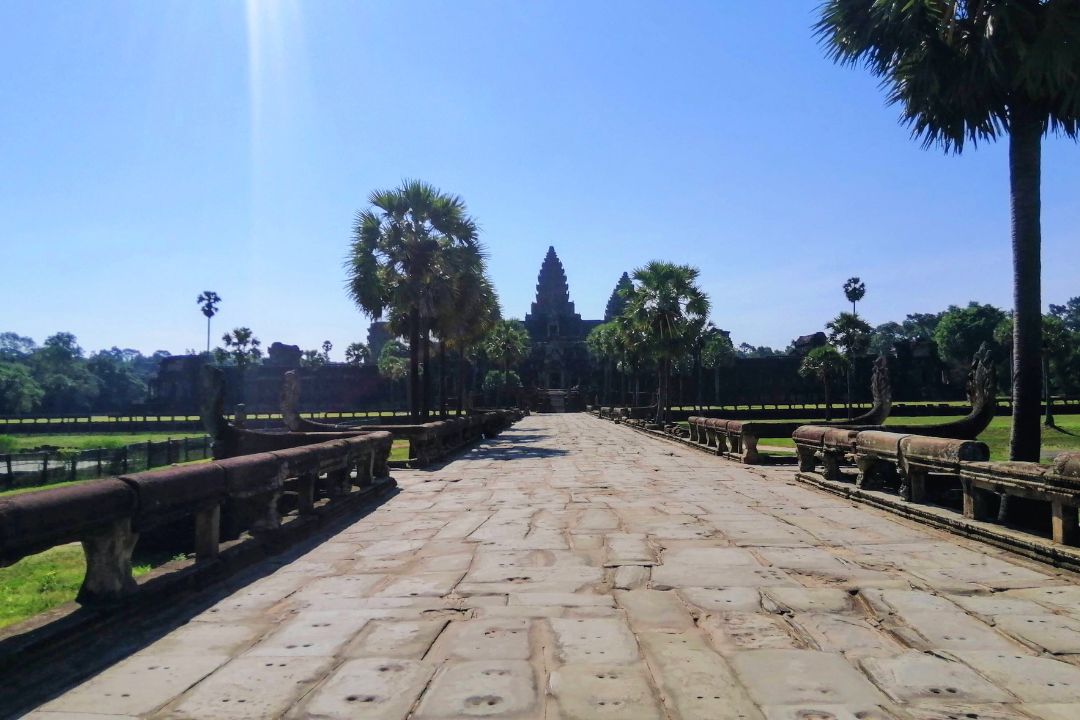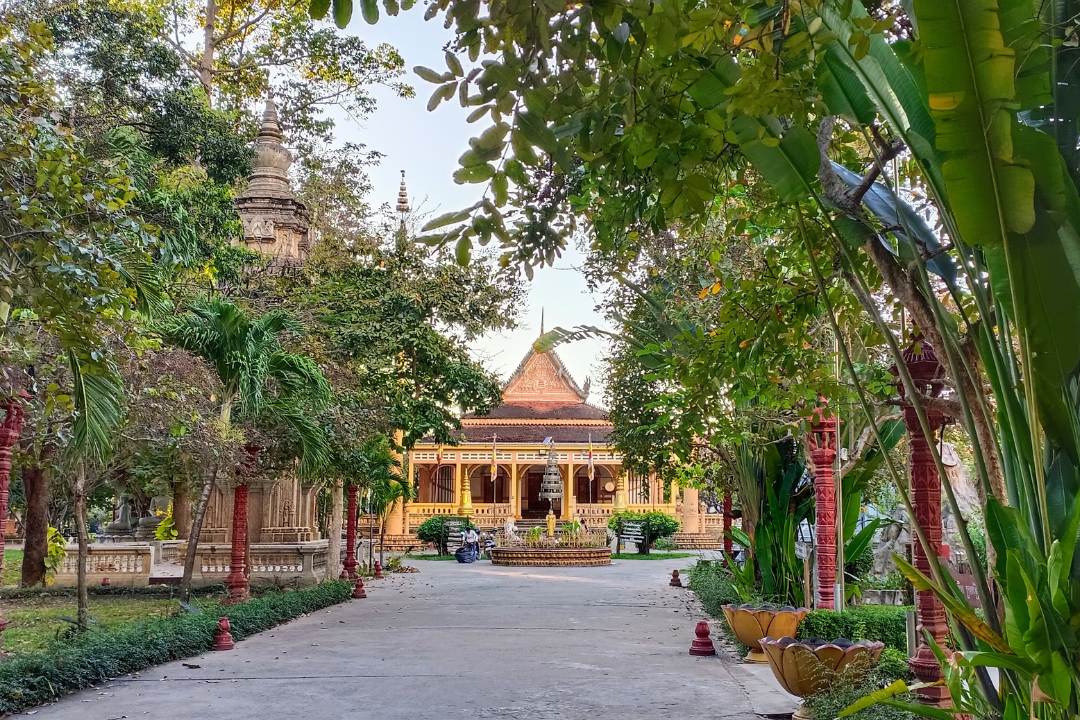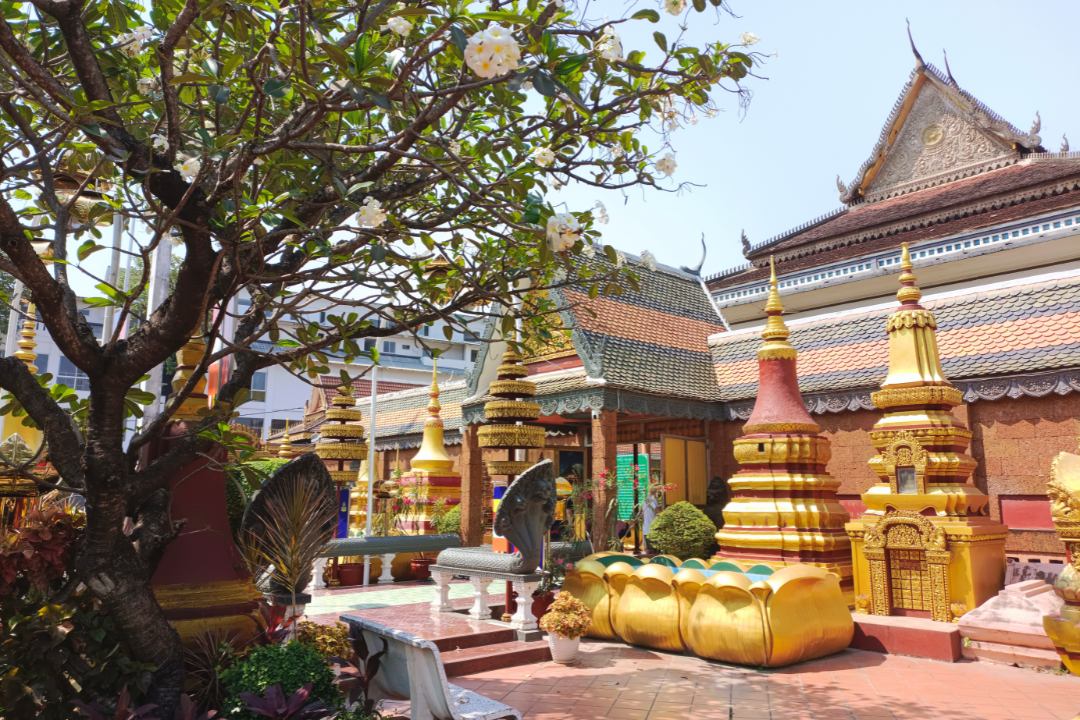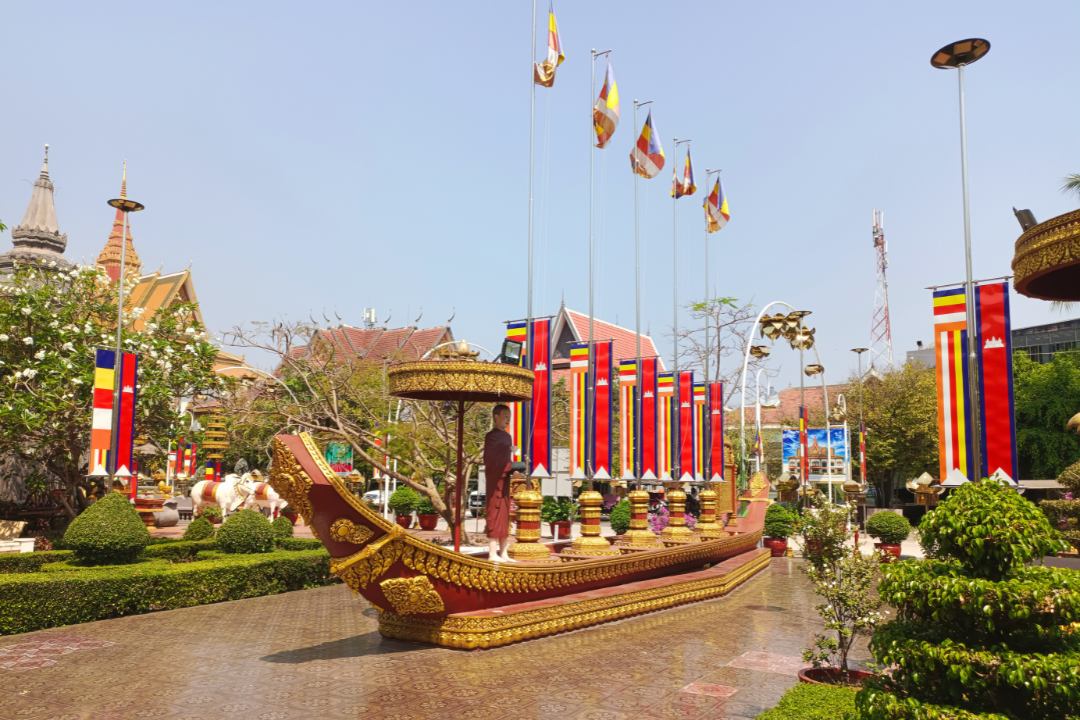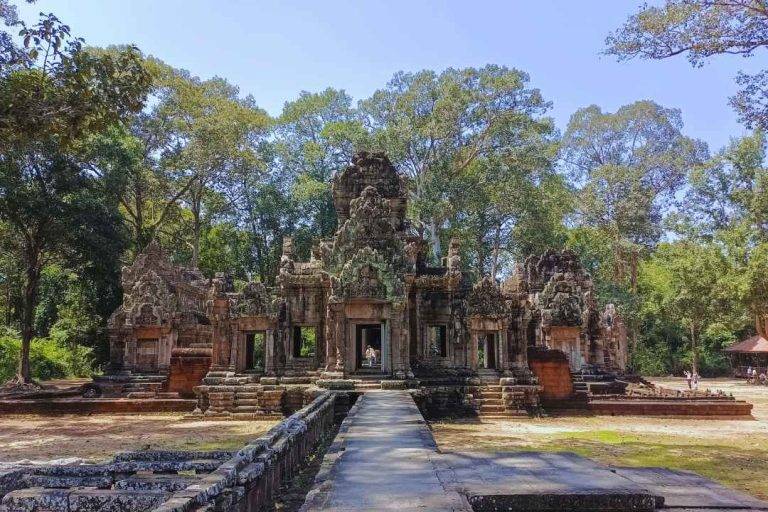
Angkor Wat Small Circuit Tour
Reveal the Hidden Gems of Cambodia's Ancient Marvels
We have the perfect Indiana Jones-style adventure for you! The Angkor Wat Small Circuit Tour takes you back in time to see old Cambodia’s essence. This tour highlights Angkor Wat and Thom Small Circuit’s stunning splendor.
Angkor Wat Small Circuit Tour
If you’ve ever dreamt of embarking on an adventure straight out of an Indiana Jones movie, buckle up, because we’ve got the perfect escapade for you! The Angkor Wat Small Circuit Tour is a journey back in time, offering an intimate glimpse into the heart and soul of ancient Cambodia. This tour showcases the best of the Angkor Wat and Thom Small Circuit, unveiling the awe-inspiring beauty of this UNESCO World Heritage site.
So, ready to explore the world’s ancient wonders and indulge your inner archaeologist? Let’s dive right in!
Exploring the Magnificent Temples on the Tour – The Must-See Temples
Before we embark on our epic journey, let’s get acquainted with the key players in this archaeological playground. The Angkor Wat Small Circuit Tour is a treasure trove of architectural marvels, each with its unique story.
1- Angkor Wat – The crown jewel of the circuit, this iconic temple complex is the largest religious monument in the world. It’s an absolute must-see, and trust us, it’ll leave you spellbound.
Constructed in the 12th century by King Suryavarman II, this architectural masterpiece remains a symbol of Cambodian heritage. Witness the splendor of its intricate carvings and explore its sprawling grounds, where monks offer blessings, creating a serene atmosphere of reverence.
2- Bayon Temple – Nestled within Angkor Thom, Bayon is famous for its massive stone faces that greet you with enigmatic smiles.
(As you embark on the Small Circuit Tour, you’ll encounter Angkor Thom, an ancient walled city encompassing various architectural wonders. One of its most remarkable temples is Bayon, featuring 216 enigmatic faces that peer down from towering structures. Stroll through the gates of this grand city, marvel at the detailed carvings of the Aspara dancers, and immerse yourself in the rich history that surrounds you.)
3- Ta Prohm – With its centuries-old trees growing out of the temple ruins, Ta Prohm is the epitome of nature reclaiming its place. You might recognize it from the Tomb Raider movie!
Nature’s Triumph. Prepare to be enchanted by Ta Prohm, where nature has intertwined itself with ancient ruins in a captivating display. As you wander through this temple, you’ll witness the relentless embrace of massive strangler fig trees, creating an ethereal atmosphere reminiscent of a lost world. Capture the mesmerizing harmony between man-made architecture and the forces of nature, and feel a sense of wonder as you explore this captivating site.
4- Baphuon – A majestic three-tiered temple mountain, this Khmer masterpiece is a testament to the architectural prowess of ancient Cambodia.
5- Terrace of the Elephants – Once used as a viewing platform for royal ceremonies, this impressive terrace is adorned with stunning elephant carvings.
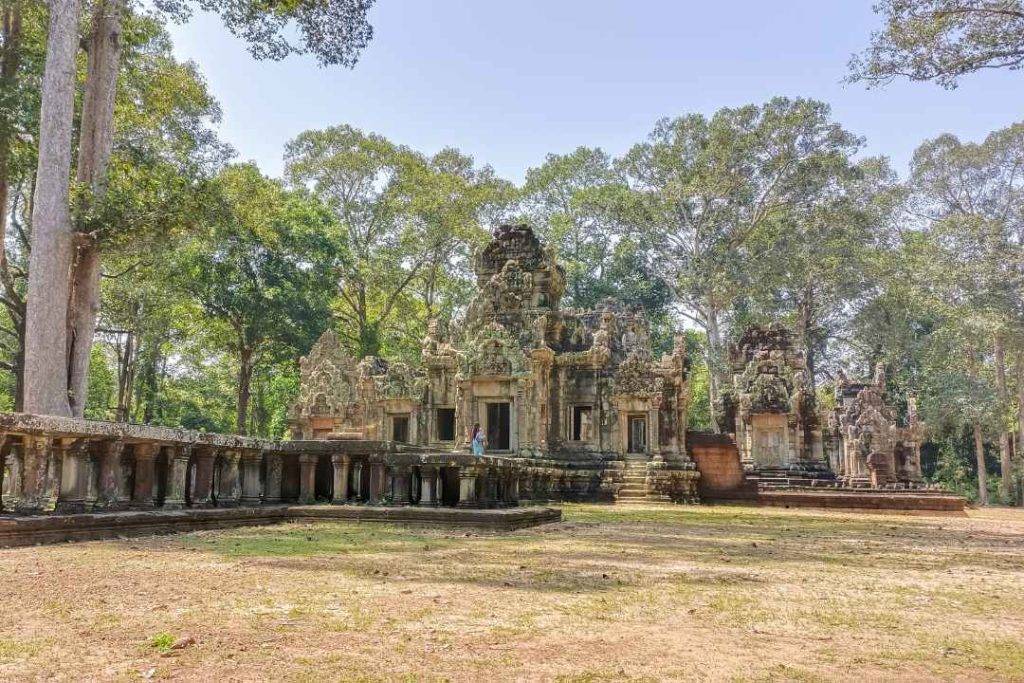
Best Time to Visit? Find the Optimal Time for the Small Circuit
Now that we’ve got our sights set on the must-see temples, let’s figure out the best time to visit. First, of course, you wouldn’t want to be caught in a torrential downpour or face sweltering heat during your once-in-a-lifetime adventure, right?
November to February – With cool temperatures and minimal rainfall, this is the ideal time for your Angkor Wat Sunrise Tour. On the other hand, this is the time of year when there are the most tourists, so you should get ready for a larger crowd.
- March to May – Although hotter and more humid, these months still offer relatively comfortable conditions for exploration. Plus, you’ll be just ahead of the rainy season!
- June to October – This is the rainy season in Cambodia, so prepare for frequent showers. However, the lush greenery and fewer tourists make it a worthwhile trade-off.
Practical Information for an Unforgettable Experience
To ensure a smooth and enjoyable visit, it’s essential to be aware of some practical details regarding entrance fees, opening hours, and ticket regulations:
The following are the entrance fees for Angkor Archaeological Park:
- Ticket for one day is $37 USD.
- Tickets cost $62 USD for three days and are good for one week.
- A ticket good for seven days and one month costs $72 USD.
- Children under the age of 12 are not charged but are need to present a valid passport.
- Tickets purchased after 5pm will only be valid for the following day.
- Note: Kulen Mountain and Bengmealea temple are not included in the ticket and require separate entry fees.
- Angkor Archaeological Park Hours:
- Angkor Wat Temple and Srah Srang: 5 am – 5:30 pm (open for sunrise)
- Phnom Bakheng and Pre Rup Temples: 5 am – 7 pm (open for sunrise and sunset)
- All other temples: 7:30 am – 5:30 pm
- The ticket office officially opens daily at 5 am – 5:30 pm. However, ticket agents usually start selling tickets at 4:30 am, allowing you to arrive earlier and secure a prime spot for sunrise viewing.
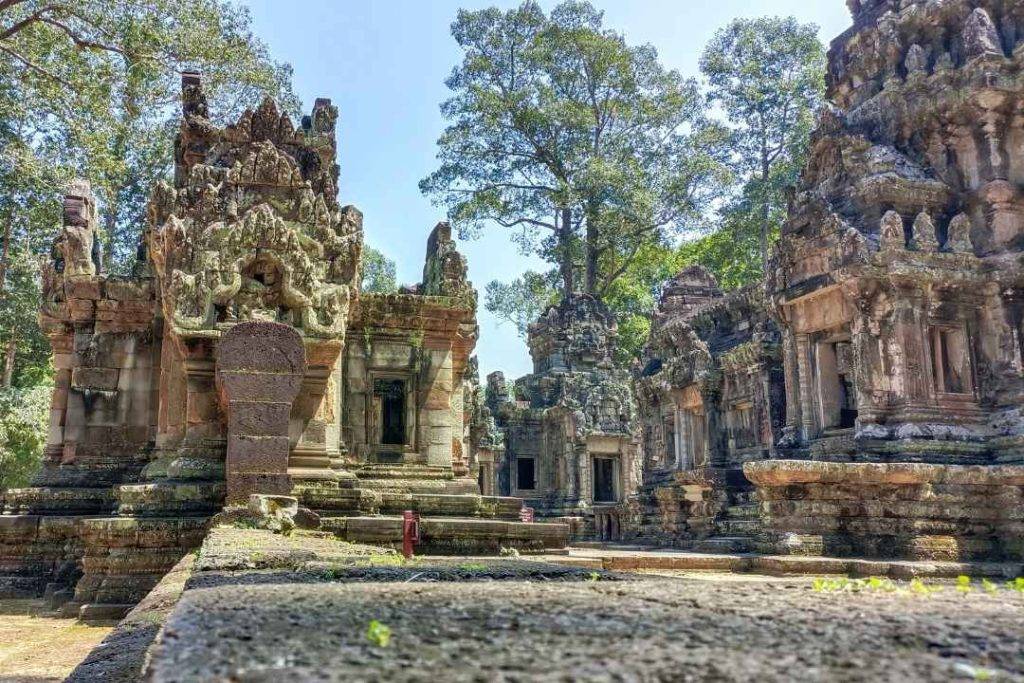
Insider Tips for Crowds – Learn How to Navigate the Crowded Temples
When you’re on a once-in-a-lifetime adventure, the last thing you want is to be jostling for space with hordes of tourists. So, how do you beat the crowds and make the most of your Private Angkor Wat Mix Temples Photo Tour?
- Arrive early – The early bird catches the worm, or in this case, the best views! Aim to reach the temples before the tour buses roll in.
- Choose a private tour – A 1-day PRIVATE Angkor Wat Small Loop Private Tour (https://mysiemreaptours.com/tour/1-day-angkor-wat-small-loop-private-tour/). This allows you to customize your itinerary and offers a more intimate experience, away from the masses.
- Visit popular temples during off-peak hours – Plan your visit to the more famous temples like Angkor Wat and Bayon during lunchtime or later in the afternoon when most tour groups take a break.
- Get off the beaten path – Some of the lesser-known temples are equally enchanting and offer a more serene experience. Keep reading to uncover these hidden gems!
- Dress Code: Remember to dress modestly, as certain areas within the park enforce a conservative dress code. Shoulders and knees should be covered to show respect for the sacred sites.
- Beat the Crowds: Arriving early for sunrise at Angkor Wat is highly recommended. It offers a stunning view and allows you to explore the temple with fewer tourists. Likewise, visiting Bayon in the early morning or late afternoon will grant you a more tranquil experience.
- Hydration and Sun Protection: Cambodia’s tropical climate can be hot and humid. It is crucial to stay hydrated and protect yourself from the strenght of the sun over Angkor.
- Respect the Temples: As you explore the temples, remember to be respectful of the sites and follow any designated pathways. Avoid touching or climbing on the structures to preserve their integrity for future generations.
- Capture Memories: Don’t forget to bring your camera to capture the beauty and magic of the Small Circuit Tour. The temples offer endless photo opportunities, from intricate carvings to enchanting tree-root-covered ruins.
“Your tour guide will also suggest some spots that may look unusual, but trust him. They are the spots no other tourists know!”
Navigating the Small Circuit Tour
To make the most of your visit, we recommend starting your tour with the breathtaking sunrise at Angkor Wat. Witness the temple’s reflection in the calm waters, creating a picture-perfect moment that will leave you in awe.
From there, follow the recommended clockwise route to ensure you experience the most popular and picturesque temples in the optimal order.
Master Techniques for Capturing Temple Shots
As you wander through these ancient wonders, you’ll want to capture memories that do justice to their magnificence. So, how do you take Insta-worthy shots of these timeless masterpieces?
- Play with light and shadow – Experiment with different angles and perspectives to capture the interplay of light and shadow in the temples.
- Frame your shot – Use doorways, windows, or tree branches to frame the temples and add depth to your photos.
- Go wide – A wide-angle lens can help you capture the grandeur of the temples in a single shot.
- Capture the details – Don’t forget to zoom in and capture the intricate carvings and bas-reliefs that adorn these temples.
- Patience is key – Wait for the right moment to snap your shot, whether it’s a break in the crowds or the perfect lighting.
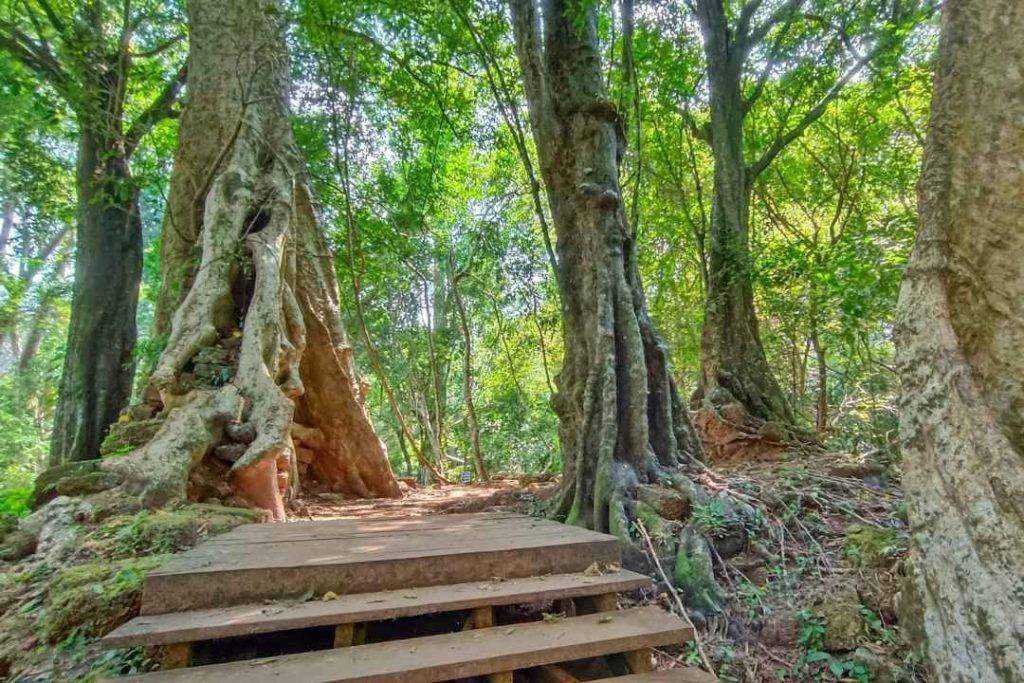
Uncover Lesser-Known Gems Along the Tour – The Hidden Gems on the Route
While the main attractions of the Angkor Wat Small Circuit Tour are undoubtedly breathtaking, there are also hidden gems just waiting to be discovered. These less well-known temples provide a more peaceful and genuine experience, allowing visitors to completely submerge themselves in the mystique of Cambodia’s ancient past.
- Preah Khan – A sprawling monastic complex, Preah Khan boasts stunning carvings and a maze-like layout, inviting you to get lost in its enchanting embrace.
- Banteay Kdei – This lesser-visited temple is shrouded in mystery and offers a serene, peaceful atmosphere, perfect for contemplation.
- Neak Pean – Located on an artificial island, this unique temple is dedicated to the healing gods and features a serene central pool.
- Ta Som – A smaller cousin of Ta Prohm, Ta Som is a charming temple adorned with captivating tree roots and intricate carvings.
- The Khmoch Gate – Also known as the Gate of the Dead, is a rich historical site. This ancient gate has been the subject of much debate and controversy in recent years, with some arguing that it should be preserved as a cultural landmark. I will argue that the Khmoch Gate should be preserved as an important piece of Cambodia’s cultural heritage. NOTE1
- Chau Say Tevoda temple – Here is another significant historical and cultural site in Angkor. The architectural and aesthetic achievements of the Khmer Empire are on display in this temple, which dates back to the early 12th century and was constructed during the reign of King Suryavarman II of the Khmer Empire. However, the temple faces the threat of deterioration and destruction due to various factors. Preserving Chau Say Tevoda temple is crucial to protect its cultural heritage and historical significance. The temple’s unique architectural style, which combines Hindu and Buddhist elements, is also a testament to the Khmer Empire’s cultural diversity and religious tolerance. Preserving Chau Say Tevoda temple would ensure that future generations can appreciate and learn from the Khmer Empire’s rich cultural heritage. The temple’s inscriptions also provide valuable information about the Khmer Empire’s political and social structures, including women’s societal roles. Preserving Chau Say Tevoda temple would allow historians and archaeologists to continue studying the Khmer Empire’s history and better understand its political and social structures.
NOTE1: “Firstly, the Khmoch Gate is a testament to Cambodia’s rich history and cultural heritage. Built during the Angkor period, the gate is a stunning example of ancient Khmer architecture and design. It is decorated with elaborate carvings and sculptures that portray scenes from Hindu mythology and is a testament to the skill and craftsmanship of the Khmer people. By preserving the Khmoch Gate, we are preserving a physical structure and a piece of Cambodia’s cultural identity.
Secondly, the Khmoch Gate is a well-kept secret that locals love to reach by walking on the Angkor Thom walls or by bicycle. So, follow your tour guide because this is an opportunity for amazing pictures few other people have.”
Enhancing Your Angkor Wat Experience
While the Small Circuit Tour provides a glimpse into the wonders of Angkor Wat, we understand that some visitors may have additional time to explore the region.
If you find yourself with extra days in Siem Reap, we encourage you to consider the Grand Circuit Tour, which offers an extended journey through more awe-inspiring temples and lesser-known hidden gems.
Complete Guide to Angkor Wat: The Best Temples to Visit
We invite you to explore our complete guide for a more comprehensive understanding of Angkor Wat and its surrounding temples. It delves deeper into each temple’s history, architectural significance, and cultural importance, allowing you to make informed decisions and create lasting memories.
Read the following articles:
How Many Days Does It Take to Visit Angkor Temples?
Conclusion
The Angkor Wat Small Circuit Tour is an unforgettable journey into the heart of ancient Cambodia, offering a glimpse into a world of architectural marvels and untold stories. Whether you’re a history buff, a culture enthusiast, or simply an adventurer seeking new experiences, this tour has something for everyone.
So, are you ready to embark on the adventure of a lifetime and uncover the hidden gems of Cambodia’s ancient marvels? Book your private tour today and let the journey begin!
Featured
Recent Articles
Can I fit Banteay Srei into a sunrise tour?
Sightseeing Siem Reap Itinerary 1 Day – 1 Day in Siem Reap That Feels Like a Local Secret, Not a Tourist Zoo
Is 10 Dollars A Good Tip In Cambodia Or Are You Overpaying Everywhere?
What Shouldn’t I Miss in Siem Reap? The Real Answer: Authentic Floating Villages and Sunset Temple Tours – Private Angkor Tours with Perfect Timing and Context
Explore more on My Siem Reap Tours
Koh Ker and Beng Mealea guided tour | Banteay Srei temple tour semi-private guided tour | Angkor Wat Sunrise shared tour | Koh Ker and Beng Mealea guided tour | Morning Siem Reap floating village tour | Afternoon Siem Reap floating village tour | Private Angkor Wat special tour | Kulen Waterfall small group guided Tour | Private Angkor Wat mix temples photo tour
